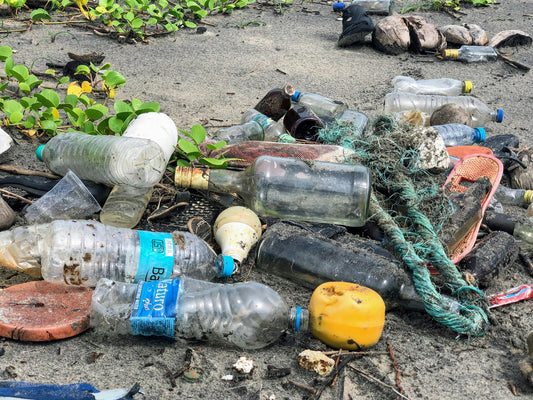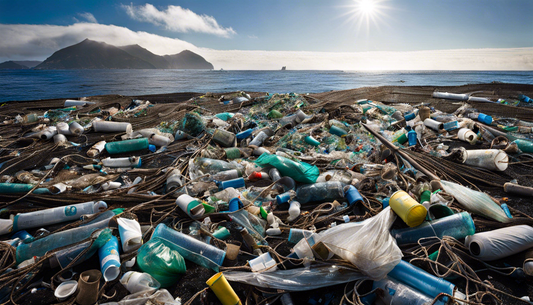Share
For small businesses, being environmentally friendly may sound like a challenge, but it does not have to be.
Small businesses, such as cafes, retail shops, offices, product manufacturers, and local service providers, can significantly impact the environment by reducing plastic waste.
Minimizing plastic use is one of the best ways to protect the environment, and it is easier than most people think.
In this blog post, we will discuss ten creative and realistic ideas for reducing the use of plastic in your small business.
Such strategies benefit the environment, improve the image of your brand, and attract more environmentally conscious consumers.
Advantages and Opportunities for Companies that Reduce Plastic Waste?
Reducing plastics is beneficial not only for the environment but also for small businesses, due to both economic and reputational benefits.
Economically, decreasing plastic utilization can minimize expenses tied to disposable products, disposal fees, and possible penalties for failing to adhere to environmental laws.
Implementing sustainable activities can also improve the company's image, appeal to an environmentally conscious clientele, and distinguish it from other competitors.
The morale of the workers is boosted because they are working for a company that is concerned about the environment and is willing to reduce its impact on the environment.
How Can Small Businesses Reduce Plastic Waste?

1. Conduct a Plastic Audit
The first step in addressing the issue is to determine the amount and kind of plastic utilized in the business.
You should conduct a comprehensive scan of all your activities to determine all the plastic products you utilize, including the packaging materials.
Simple Steps to Conduct Audit:
- Identify All Plastic Use
- Analyze Waste Streams
- Evaluate Opportunities for Reduction
- Create a Plan and Prioritize
- Execute on the Plastic Reduction Opportunities
Example:
One of the biggest opportunities for many production goods companies is packaging waste.
It is beneficial to ban the use of plastics in packaging and encourage the use of environmentally friendly materials such as paper, cardboard, and biodegradable materials. This should be done by encouraging other suppliers to apply similar measures.
According to the 2020 Ellen MacArthur Foundation report on the topic, many companies have already set targets for the change. For example, Unilever and Coca-Cola have pledged to make 100% of their packaging recyclable, reusable, or compostable by 2025.
Both copanies are among the worst polluters in the world and it remains to be seen if they will adhere to these targets.
2. Implement a Recycling Program

Provide trash and recycling bins with appropriate labels around your working environment to ensure that employees dispose of plastic waste appropriately.
Recycling one ton of plastic saves 7.4 cubic yards of landfill space and reduces greenhouse gas emissions equivalent to 1,000–2,000 gallons of gasoline.
3. Educate and Engage Employees
Schedule meetings with the employees to discuss the issue of excessive plastic use and how they can avoid it. Employees should also be encouraged to propose changes themselves. Often they have the best ideas from their day-to-day routine.
Employee Participation:
Millennials, also known as Generation Y, comprise 75% of the workforce and are seeking employment with socially responsible companies.
4. Reduce Single-Use Plastics

Policies prohibiting the use of disposable plastics in the workplace, including straws, forks, spoons, and cups, should be enforced. These are not only among the easiest changes for a more sustainable business, they will also save money in the long run.
Consumer Preferences:
A survey conducted by McKinsey & Company shows that 60% of consumers are willing to spend more money on products from eco-friendly businesses.
5. Promote Reusable Products
Promote the use of reusable products, such as water flasks, cups for tea or coffee, and shopping bags. Offer employees and customers branded reusable items such as cups, plates, and spoons.
Some companies make it a ritual to give new joining employees their branded reusable cup and water bottle.
6. Partner with Sustainable Suppliers
Choose suppliers that are committed to the issue and have adequate policies to reduce the use of plastics.
Success Example:
An example of a company that has set strict rules for its suppliers is Patagonia, an outdoor clothing brand that has reduced its plastic usage and encourages recycling.
7. Encourage Take-Back Programs
Offer take-back programs for products that can be reused, refurbished, or recycled. This approach helps avoid cases where products are used once and then disposed of without further use.
Win-Win: Taking back used products is a win for everyone involved.
- It allows you to resell products at a reduced price
- It provides a valuable touchpoint for customer engagement
- It provides the customer a chance to updgrade to a new product, without producing waste
Take back programs can also take another flavour if you focus on employees.
Offering repair cafes and product swaps are fun ways to show you care about the environment.
8. Opt for Digital Solutions
Paperless Operations: Ban the use of plastic products often used in the office, and reduce the need to print on paper.
Do not use plastic stationery as much as possible; instead, utilize e-signatures, digital documents, and online messaging.
Efficiency Gains:
Adobe’s report revealed that companies that adopt paperless document processing could reduce paper usage by as much as 90% and avoid unnecessary wastage.
9. Adopt Refillable Products

Implement refill stations for products like cleaning supplies or personal care items. This reduces the reliance on single-use plastic packaging and promotes a circular economy.
Two easy examples for that are refillable soap for the washrooms and refillable all purpose cleaner.
10. Support Plastic Reduction Initiatives
Participate in local or national campaigns to reduce plastic use and support organizations fighting to reduce plastic use and create a collaborative impact.
A great way to show you care is offering an impact day for employees. By cleaning up a park or beach together, you can not only do something good for the environment. It is also a great way for teambuilding and socializing among employees.
Businesses That Have Reduced Plastic Consumption

1. Notpla
Notpla is an example of an organization that made an innovative idea to fight plastic pollution their whole business model.
Notpla is an innovative organization that converts seaweed into biodegradable and edible packaging.
Its products are designed to substitute for single-use plastics, and it was recognized for offering edible pods during events such as the London Marathon, thus saving thousands of plastic bottles.
2 Shop Without Plastic
SWOP - Shop Without Plastic is a North American company established by Ava and Lars in 2022. It aims to provide the market with plastic-free items that can be used in everyday life.
Their journey started as lovers of nature, hiking, and camping, who pointed to plastics littering the planet.
They understood that the issue was rooted in the lack of convenience of buying sustainable products. Thus, they aim to provide a single marketplace for consumers that offers plastic-free essentials.
3.Otto's Coffee House
A small coffee shop in Kent, UK made the news a few years back, when they decided to only serve customers that bring their reusable cup.
The PR stunt created a sheer hype around the coffee shop and made it famous all over the world.
Not only did they make a statement for sustainability, the commitment to eco-friendly practices also helped their business.
4. Refilleries
There are many zero-waste or refill stores being established around the world today. In these stores, customers are free to bring their own containers and try different products.
Sustainability benefits everyone
By implementing such eco-friendly practices, small businesses can lower their operational costs, enhance their brand image, and demonstrate their commitment to sustainability.
Nowadays, businesses rely on Generation Y and Generation Z for most of their sales. Both these generations are known for their commitment to environmental consciousness and sustainability.
So, by reducing plastic waste, local businesses will eventually attract more customers and boost their sales.
Do you know a small business that reduces its plastic impact? Leave a comment below and engage in the discussion!
We hope you enjoyed this article. If you want to read more like this, make sure to check out our Blog and follow us on Instagram. If you are interested in truly sustainable products, check out our Shop.








